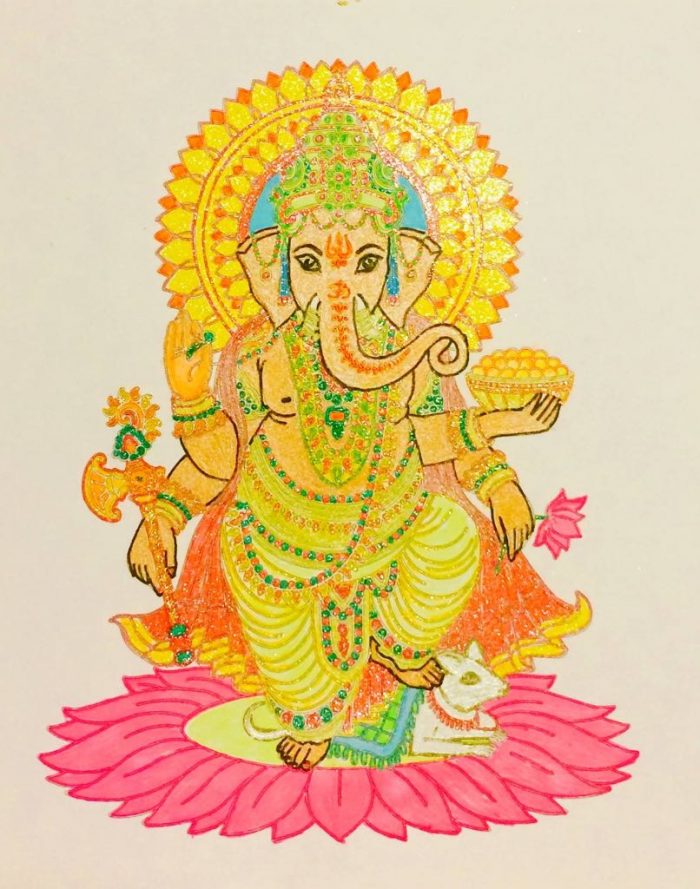

Ganesh Chaturthi : Symbolism and Significance
Tomorrow, September 13th 2018 is Ganesha Chaturthi- an important Hindu Festival celebrated all across India and other countries for ten days. This festival is marked with installation of clay Ganesha idols. The festival ends with immersion of these clay idols in water on the tenth day signifying nothing is eternal- we need to bid good byes to both festivities and sorrows.
Happy Ganesh Chaturthi!
Hinduism is full of symbolisms if we dig deeper into philosophical aspects of it. It is replete with metaphors and symbolisms that are not very obvious. Hinduism is often known for its thousands of Gods and Goddesses in different forms- some appear with human figures and some with as a form that is human as well as non human. One such God is Ganesha. The ever popular Ganesha who sits joyfully with a pot belly, elephant face, four arms each holding something. I have spotted some form of Ganesha in countries including India, USA, Thailand, Indonesia- Bali. He is worshipped by not only Hindus but by Buddhists and Jains too.
Earliest mention of “Ganapati” another name for Ganesha appears in “Rig veda” a collection of Vedic Sanskrit Hymns likely composed around 1700-1100 BCE. The name Ganesha translates to “Lord of Group.” “Gan” means group. Our universe is a group of atoms and energies. Without a supreme energy to maintain and govern these, it would be an utter chaos. Ganesha is that supreme energy. As per Hindu scriptures he is the son of Parvati and Shiva.
There is a popular story behind Ganesha’s creation according to which he was created out of his mother Parvati’s body dirt. In another story, he gets his elephant head when he obstructs the path of Shiva. Such stories although sound very child like they carry a deep philosophical meaning.
Symbolism and Significance of Ganesha:
1) His birth from dirt:
This shows how we can gain knowledge and wisdom even if we are ignorant. Dirt signifying ignorance doesn’t need to remain that way. Through our efforts we can overcome our ignorance or lack of wisdom.
2) His elephant head:
Elephant represents both knowledge and power. When there are obstacles in the path, elephants don’t walk around it, they rather remove the obstacle and walks past it. Ganesha is said to be the remover of obstacles. His elephant head signifying that knowledge, power and wisdom can overcome obstacles of all forms- physical and mental.
2) His big pot belly:
Represents generosity and acceptance. It also symbolizes the whole cosmos. The ability to accept infinite without any discrimination or judgement as well as the generosity of giving back. Snake around his belly represents the cosmic energy in all forms.
3) His large ears: signify the ability to listen- the ability to keenly listen and assimilate ideas- to be a better listener.
4) His two tusks: He is depicted with two tusks- right one representing wisdom and the broken left tusk representing emotion, conveying that one needs to conquer emotions with wisdom.
5) Ganesha has four arms like many other Hindu Gods and Goddess. The arms signify four inner attributes of the subtle body: mind intellect , ego and conditioned conscience. We all have these attributes within us. There is an axe in one of those arms striking our ignorance and guiding us into the right path. Second hand holds a whip conveying wordy attachments and desires that we should rid ourselves from. His third hand is turned towards us in a blessing pose and the fourth hand holds a Lotus flower symbolizing purity of inner self.
6) Ganesha’s mouse: Ganesha with elephant head and pot belly rides on a mouse. Mouse represents our ego and our wandering mind that we should keep in control. Mouse is also shown sitting near the sweet Laddus – depicting control over desires and not getting tempted too much with worldly pleasures.
Here is a Ganesha Kirtan to help with your spiritual practice:
CLICK HERE to listen
About the Author:
Kamini Natarajan is a kirtan singer, yogini and author based in Los Angeles area. To learn more about her visit http://www.kaminimusic.com
Browse Front PageShare Your Idea
Comments
Read Elephant’s Best Articles of the Week here.
Readers voted with your hearts, comments, views, and shares:
Click here to see which Writers & Issues Won.







